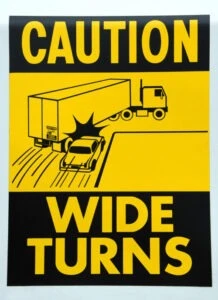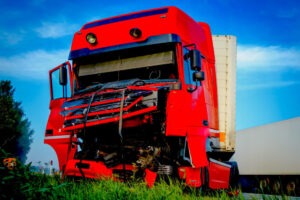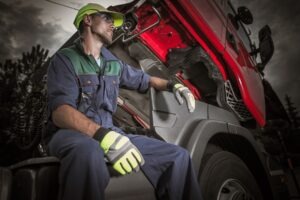
If you have ever driven behind a large truck, you have likely seen a sign warning you to stay back. You’ve likely also seen one warning you of wide turns. When a truck makes a right turn, they need more space. But sometimes, passenger vehicles don’t realize this and try to squeeze by the truck before it completes the turn. When this happens a Florida wide right turn truck accident may occur.
The Basics of Wide Right Turns
Trucks don’t turn in the same way passenger cars do. When a truck makes a right turn, the cab of the truck swings wide, beyond the actual lane they will be turning into. This movement allows the truck’s trailer to move into the lane without going over the curb. But naturally, the cab has to return to its designated driving lane. When the cab of the truck begins to line up with the trailer it can create a “squeeze zone.” If you are driving to the right of the truck thinking that there is available space, you could become pinned by the truck. According to the Federal Motor Carrier Safety Administration, the turning radius of a large truck is 55 feet. Never pass a truck on the right when it is making a right-hand turn.


Expect More, Receive More: Legal Support That Feels Like Family
Who’s at Risk
Knowing the dangers that large trucks pose can help you stay safe on the road. But staying safe when a truck is making a right turn is more than just avoiding passing on the right. There are several ways you can become involved in an accident. Let’s take a closer look at who is at risk of serious injury in a truck accident.
- Curbside drivers when there are two turn lanes: Some roads have two turn lanes to allow drivers to turn right. A large truck will usually take the outside lane to allow them enough turning room. As a passenger vehicle, you may not even think before proceeding to turn. But turning right next to a large truck can be dangerous. If you are next to a truck in a turning lane, hang back and allow them to complete their turn before moving forward.
- Bicyclists and pedestrians: Sometimes trucks don’t have enough room to complete a right-hand turn. It’s not uncommon to see the back end of a truck bounce over the side of a curb. This is dangerous when there are bicyclists or pedestrians on the bike path or sidewalk. As pedestrians, it’s important to remember that trucks have large blind spots. It is particularly difficult for them to see small bikes. If you are in a bike lane and see truck getting ready to turn, stay back.
- Drivers going the opposite direction that the truck is turning into: Narrow roadways or even two-lane roadways can make it difficult for a truck to stay in their lane of traffic. In many cases, they have to take up some of the lane of the opposite flow of traffic. If a truck driver misjudges the amount of room they have or the oncoming driver does not allow the driver enough room, a collision can occur.
Common Causes of Wide Right-Turn Accidents
Sometimes a passenger vehicle will try to sneak in and get caught between a large truck, but passenger vehicles are not always to blame. Driving a large truck takes a lot of skill and practice. Failure to obey traffic laws or poor training can lead to an accident. Common causes of wide turn accidents include:
- Poor training: Right-hand turns must be done a certain way. Swing too far out and the driver can cause a collision with oncoming traffic. Stay too close to the curb and the truck may go over the curb and potentially roll over. When a driver does not properly execute a right-hand turn, it can be dangerous to surrounding vehicles.
- Failure to check blind spots: All truck drivers should check their blind spots before making a turn. This will alert them to whether vehicles are attempting to get by. If the driver sees a driver to the right of them, they should not attempt the turn until the vehicle is out of the danger zone.
- Distracted driving: Wide turns are complicated to the average driver, but for an experienced truck driver, it’s just part of the day. This may make a driver take the turn for granted. Distracted driving may include looking down at a phone, adjusting the radio, or a distraction outside the vehicle.
- Drunk driving: Driving under the influence is always dangerous. For a large truck, it can cause catastrophic injuries. Alcohol can interfere with judgment, affect depth perception, and make it difficult to control the vehicle.
- Speeding: Large trucks are hard to maneuver. A driver should take a right turn slowly to avoid hazards. When a driver takes a turn too fast, not only do they increase the risk that they will collide with another vehicle, but they also increase the risk of a rollover.
- Failure to use turn signals: As drivers, we rely on turn signals to know when the other driver is planning to turn. When a truck driver does not use their turn signal, they put smaller vehicles in danger. It is not a simple courtesy. Failure to signal can cause a driver to continue ahead and become pinned in the truck’s “squeeze zone.”
- Lack of experience with the area: While the basic mechanics of a turn are the same, some turns are different than others. Some roads have less room to turn and others have barriers that a driver must navigate. When a driver is unfamiliar with the roads they may have to adapt as they go. Sometimes this can lead to catastrophic results.
What About Left Turns?
Left-turn accidents are dangerous as well, but not in the same way. A left turn does not require a wide turn. This eliminates “squeeze zones.” However, these large trucks need quite a bit of room to turn and may move into neighboring lanes. In addition to the large size of these trucks, the simple act of making a left turn can be dangerous for any driver. A left turn requires a driver to turn across at least one lane of traffic. If there are no signal lights, a driver must rely on their judgment to determine when to turn. In fact, left turns are considered so dangerous that both UPS and FedEx have policies against drivers making left-hand turns.
Pursuing Financial Compensation After an Accident
An accident is never easy. With large trucks, the physical, emotional, and financial stress increases dramatically. Large trucks can create enormous damage. When a passenger vehicle crosses paths with a truck, serious injuries are not uncommon. Injuries like traumatic brain injuries and broken bones can be painful and costly. As the victim of an accident, this is not a cost you should have to take on alone. A personal injury claim can help you recover costs associated with your accident and begin the recovery process. Typical costs included in personal injury claim include:
- Medical costs: Medical bills are often the most expensive part of an accident. While your PIP coverage will cover some of these costs, it is often exhausted after the initial ambulance ride. After you use all your PIP a personal attorney can work with your care providers to have payment delayed until the end of the case. Covered costs often include doctor visits, hospital stays, surgeries, medications, medical devices, physical therapy, medical transportation, and in-home nursing care.
- Lost wages: Even minor injuries can cause you to miss a few days from work. More serious injuries may make you unable to return to work. Lost wages cover time missed as a result of the accident. If you are unable to return to work, you may be able to file a claim for loss of earning capacity (if you can return to a job at a lower wage) or future wages (if you are unable to return to work at all). The amount will generally be calculated using your previous wage and your age and be paid in a lump sum.
- Pain and suffering: Accidents cause physical and emotional pain. But there is no doctor bill to give a direct cost for this pain. Pain and suffering is used to compensate an accident victim for the physical and mental strain of an accident. This may include immediate pain, chronic pain, anxiety, depression, PTSD, or other mental health issues.
- Loss of companionship: An accident can change a relationship. If a victim suffers a traumatic brain injury, they may not be the same person. Their mood may change or they may be unable to talk. A spinal cord injury can make it so someone who was the sole financial provider can no longer work. And mental health issues can change the dynamic of a relationship. When injuries from an accident affect personal relationships, the victims should be compensated.
- Wrongful death: Unfortunately, accidents involving large trucks often involve fatalities. The loss of a loved one can be devastating. A wrongful death claim is not meant to compensate you for the death of a loved one, but rather transfer the financial burden associated with the accident to the at-fault party. This may include funeral costs, burial costs, and any outstanding medical bills.
How Comparative Negligence Applies in Right Turn Accidents
In cases involving large trucks, the at-fault party will seldom accept full responsibility. There are many reasons for this. For the driver, an at-fault accident can cause them to lose their job and may make it difficult to get another job in the trucking field. For the trucking company and the insurance company, it’s about money. Truck accidents can be very expensive. Many trucking companies employ expensive, aggressive attorneys to defend them in the event of an accident. The more blame they can put on you, the less they have to pay.
But what does this mean? Being partially to blame for an accident does not preclude you from filing a claim against the other party. Florida utilizes pure comparative negligence to determine the value of a claim. Unlike states that exercise modified comparative negligence, Florida drivers can file a claim even if they hold the bulk of the blame in the accident.
How a Personal Injury Attorney Can Help
After a truck accident, you will likely receive an offer from the other party’s insurance. When you are dealing with a large truck company, this offer may seem pretty high. However, in most cases, it is far lower than what it actually should be. Insurance companies try to get away with paying as little as possible. They know that if you do not have an attorney, you may not know the value of your case.
Personal injury claims are complicated and rely on a variety of factors. A personal injury attorney can interview witnesses, review your medical records, and bring in expert witnesses to get a better understanding of how much your case is actually worth. Injuries from a large truck accident can require lifelong care. This care is expensive and is often not covered by the small offer the other party makes. Don’t undervalue your injuries. Know your rights and know what you deserve. If you have been injured in a large truck accident, you deserve fair compensation for your injuries. Contact a truck accident attorney for more information about your case.






